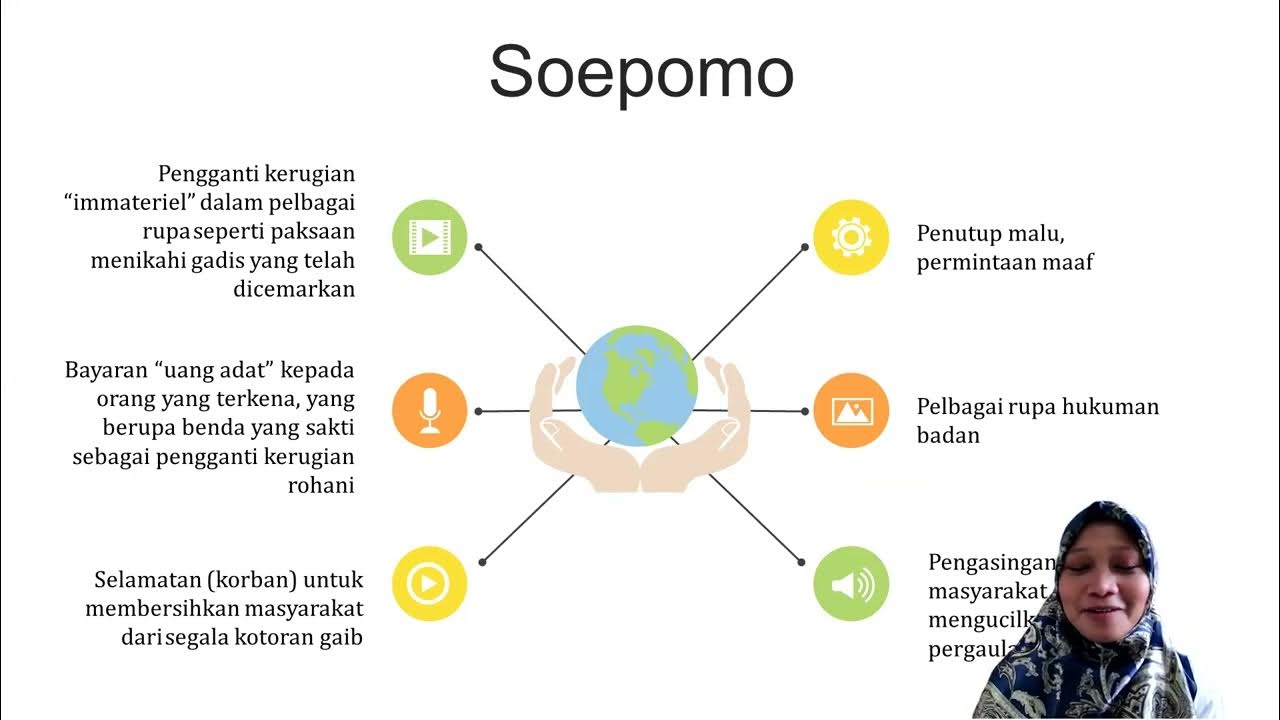Hukum Waris Adat
Summary
TLDRThis video provides an in-depth exploration of Hukum Waris Adat (Traditional Inheritance Law) in Indonesia. It discusses three main systems of inheritance: patrilineal, matrilineal, and parental. The speaker elaborates on the core principles of inheritance, including Ketuhanan (God’s will), Kebersamaan (togetherness), Kerukunan (harmony), and Keadilan (justice). Furthermore, the video outlines three distinct forms of inheritance—kolektif (collective), individual, and mayorat—and their practical applications in various indigenous communities. The presentation emphasizes the spiritual and social dimensions of inheritance beyond mere material wealth, highlighting its cultural significance.
Takeaways
- 😀 Adat inheritance law encompasses both tangible and intangible assets, including titles, family names, skills, and even sacred mantras.
- 😀 Unlike national civil law, adat inheritance law is broader, as it addresses the transfer of both material and non-material inheritance.
- 😀 There are three main systems of adat inheritance in Indonesia: patrilineal, matrilineal, and parental.
- 😀 The **patrilineal system** traces inheritance through the father's line, where male descendants are the primary heirs.
- 😀 The **matrilineal system** traces inheritance through the mother's line, with daughters being the primary heirs.
- 😀 The **parental system** traces inheritance from both parents, giving equal inheritance rights to both male and female descendants.
- 😀 The key principles of adat inheritance include **Divinity**, **Togetherness**, **Harmony**, and **Justice**.
- 😀 **Divinity** (Ketuhanan) emphasizes that inherited wealth is a gift from God and is often governed by religious inheritance laws, such as Islamic inheritance in Indonesia.
- 😀 **Togetherness** (Kebersamaan) means that inherited assets are meant to be enjoyed collectively, not individually divided.
- 😀 **Harmony** (Kerukunan) ensures that inheritance distribution is done in a way that maintains family unity and avoids conflicts.
- 😀 **Justice** (Keadilan) requires that inheritance be distributed fairly, based on the rightful share of each heir.
- 😀 There are three forms of adat inheritance: **collective**, **individual**, and **mayorat**. In **collective inheritance**, assets are not divided but managed and enjoyed together; in **individual inheritance**, assets are divided among heirs; in **mayorat inheritance**, only one heir (usually the eldest son) receives the inheritance to manage and take care of the family.
Q & A
What is Hukum Waris Adat?
-Hukum Waris Adat is the customary inheritance law in Indonesia that governs the transfer of both material and immaterial properties from the deceased to their heirs. Unlike national inheritance laws, it also includes non-physical assets like titles, names, and sacred knowledge.
How does Hukum Waris Adat differ from national inheritance laws?
-Hukum Waris Adat is broader as it includes not only material assets such as land and heirlooms but also non-material ones like titles, family names, and sacred knowledge. National inheritance laws typically focus on material possessions and follow civil law principles.
What types of inheritance does Hukum Waris Adat cover?
-Hukum Waris Adat covers both tangible property (e.g., land, heirlooms) and intangible property (e.g., titles, family names, skills, mantras).
What are the three primary inheritance systems in Indonesian customary law?
-The three primary inheritance systems are patrilineal, matrilineal, and bilateral (parental). The patrilineal system follows the father’s lineage, the matrilineal system follows the mother’s lineage, and the bilateral system gives equal rights to both sons and daughters.
What is the patrilineal inheritance system?
-In the patrilineal system, inheritance is passed down through the father’s side. Typically, sons inherit, and daughters follow their husband's family after marriage.
How does the matrilineal inheritance system work?
-In the matrilineal system, inheritance follows the mother's side. Daughters inherit the family property, unlike in the patrilineal system where sons typically inherit.
What does the bilateral (parental) inheritance system entail?
-In the bilateral or parental system, inheritance is drawn from both the father's and the mother's sides, allowing equal rights for both male and female heirs.
What are the key principles that guide Hukum Waris Adat?
-The key principles are: the Principle of Divinity (Ketuhanan), which sees inheritance as a blessing from God; the Principle of Togetherness (Kebersamaan), encouraging collective use of inheritance; the Principle of Harmony (Kerukunan), promoting family unity during inheritance division; and the Principle of Justice (Keadilan), ensuring fairness in the distribution of inheritance.
What is collective inheritance in Hukum Waris Adat?
-In collective inheritance, the inherited property is not divided among individual heirs but is managed and enjoyed together as a family or community.
What is the concept of mayorat or primogeniture in inheritance?
-In the mayorat system, the entire inheritance is passed down to one heir, typically the eldest son. This heir is responsible for managing the property and supporting their younger siblings until they reach adulthood or marriage.
How does the principle of justice apply to inheritance in Hukum Waris Adat?
-The principle of justice ensures that inheritance is distributed fairly among heirs, with each receiving their rightful share according to established customary rules.
Why is the principle of kerukunan (harmony) important in Hukum Waris Adat?
-The principle of kerukunan emphasizes the importance of maintaining family unity during the inheritance process. It seeks to prevent disputes and ensure that inheritance is distributed in a way that promotes family harmony.
Outlines

Dieser Bereich ist nur für Premium-Benutzer verfügbar. Bitte führen Sie ein Upgrade durch, um auf diesen Abschnitt zuzugreifen.
Upgrade durchführenMindmap

Dieser Bereich ist nur für Premium-Benutzer verfügbar. Bitte führen Sie ein Upgrade durch, um auf diesen Abschnitt zuzugreifen.
Upgrade durchführenKeywords

Dieser Bereich ist nur für Premium-Benutzer verfügbar. Bitte führen Sie ein Upgrade durch, um auf diesen Abschnitt zuzugreifen.
Upgrade durchführenHighlights

Dieser Bereich ist nur für Premium-Benutzer verfügbar. Bitte führen Sie ein Upgrade durch, um auf diesen Abschnitt zuzugreifen.
Upgrade durchführenTranscripts

Dieser Bereich ist nur für Premium-Benutzer verfügbar. Bitte führen Sie ein Upgrade durch, um auf diesen Abschnitt zuzugreifen.
Upgrade durchführen5.0 / 5 (0 votes)






